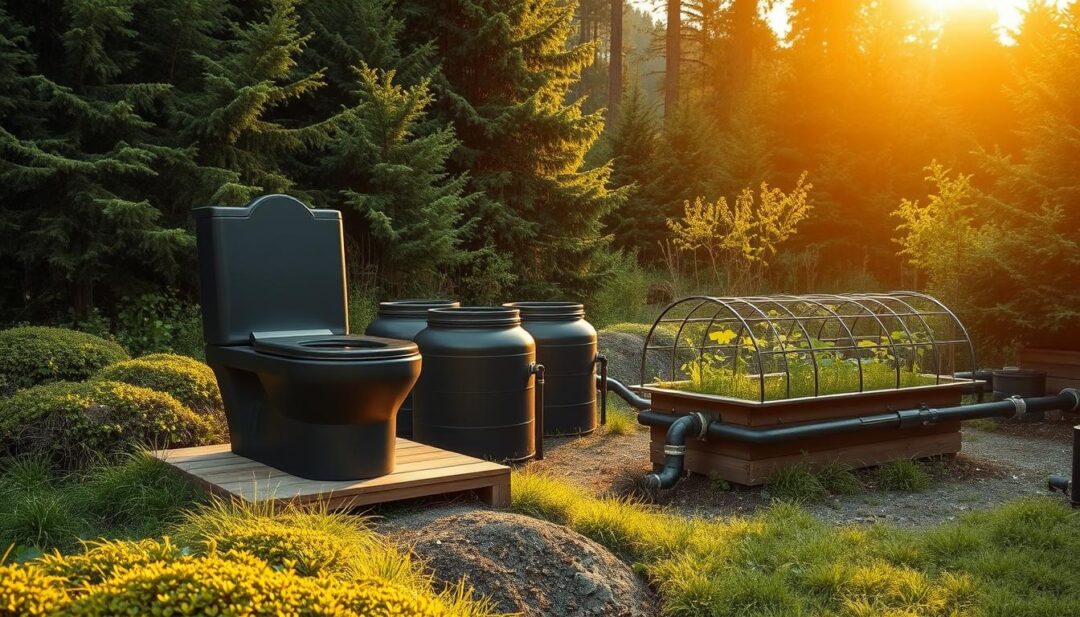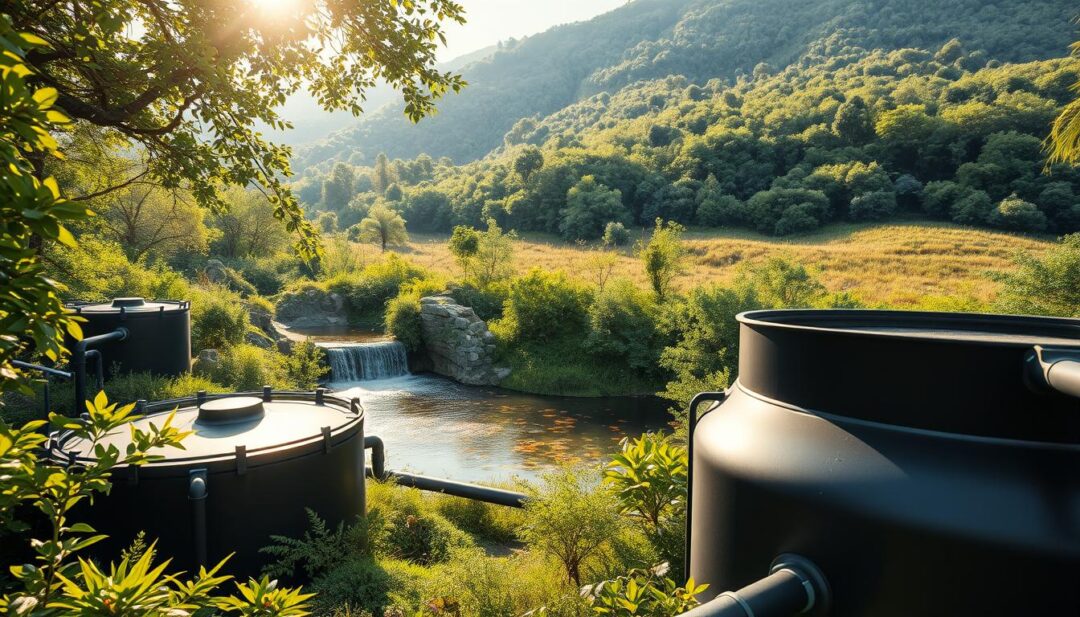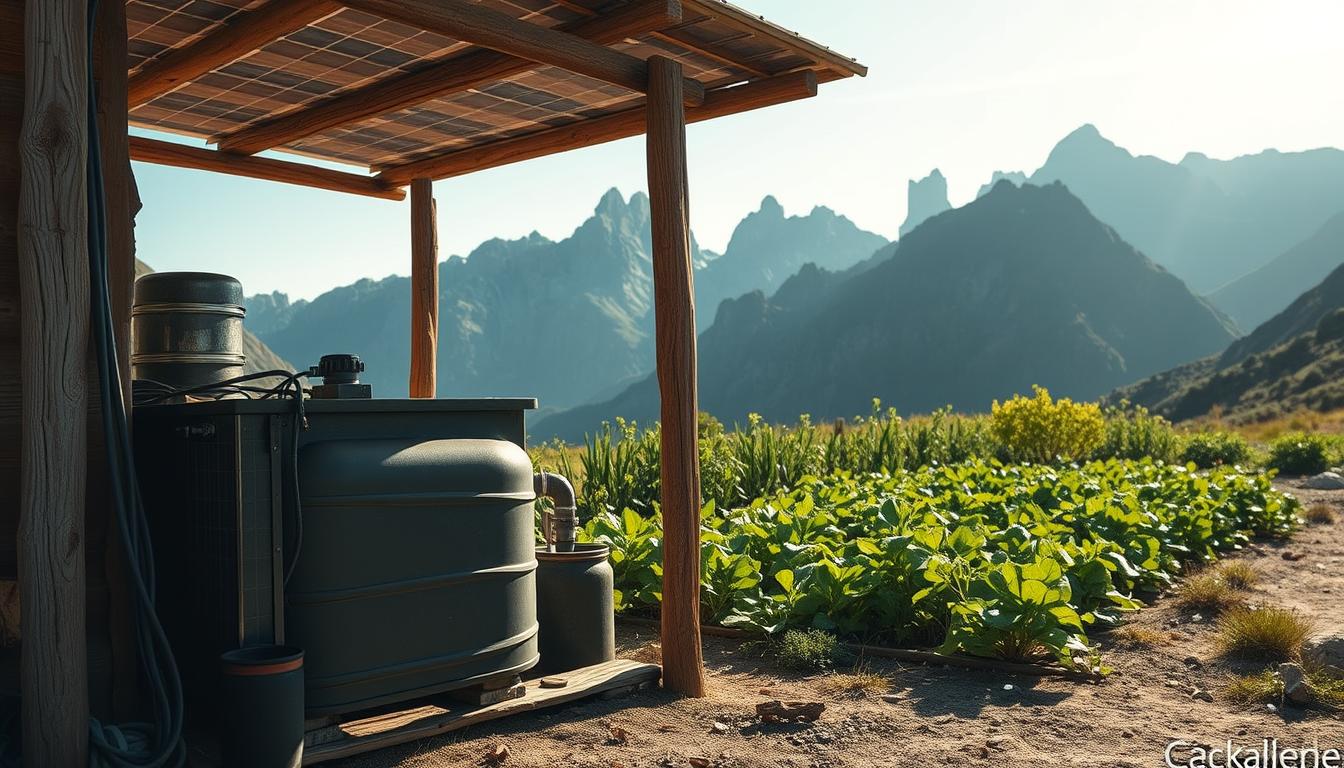Off-Grid Black Water Management: Tips and Strategies
Are you aware of the potential environmental and health hazards associated with improper black water disposal off-grid? For those living off the grid, managing wastewater, particularly black water, is crucial for maintaining a sustainable and healthy living environment.
Efficient off-grid black water management requires careful consideration of treatment and disposal methods to prevent contamination and ensure eco-friendliness.
Understanding the importance of proper black water management is the first step towards implementing effective sanitation methods. This involves exploring various eco-friendly black water treatment options and DIY maintenance techniques.
Key Takeaways
- Efficient off-grid black water management is crucial for a healthy environment.
- Proper treatment and disposal methods prevent contamination.
- Eco-friendly black water treatment options are available.
- DIY maintenance techniques can enhance off-grid sanitation.
- Understanding black water management is key to effective sanitation.
Understanding Black Water in Off-Grid Living
Understanding black water is essential for anyone embracing off-grid living, as it directly impacts the health and sustainability of the environment. Black water refers to wastewater that contains human waste, making it a potential health hazard if not managed properly.
What Constitutes Black Water
Black water is characterized by its contamination with human feces and urine, making it distinct from other types of wastewater. This type of water is considered hazardous due to the presence of pathogens and other harmful microorganisms.
Difference Between Black Water and Grey Water
The primary distinction between black water and grey water lies in their composition. Grey water comes from sinks, showers, and washing machines, and is generally considered less harmful than black water. However, both types of water require appropriate management to prevent environmental contamination.
- Black water contains human waste and is considered hazardous.
- Grey water comes from domestic activities like washing and bathing.
Sources of Black Water in an Off-Grid Home
In an off-grid home, the primary source of black water is the toilet. In some cases, kitchen sinks may also contribute to black water if they are connected to the black water system.
Effective black water management involves understanding its sources and composition. By recognizing the differences between black water and grey water, individuals can implement appropriate off-grid sanitation methods to minimize health risks and environmental impact.
How to Deal with Black Water Off Grid: Essential Principles
Managing black water in off-grid settings involves several key considerations. The primary goal is to minimize environmental impact while maintaining hygiene and functionality.
Volume Reduction Strategies
One of the first steps in managing black water off-grid is to reduce its volume. This can be achieved through the use of low-flow fixtures and appliances, which significantly decrease the amount of wastewater generated.
Low-Flow Fixtures and Appliances
Installing low-flow toilets, showerheads, and faucets can drastically cut down on water usage. For instance, low-flow toilets use as little as 0.8 gallons per flush, compared to the standard 1.6 gallons.
Water Conservation Techniques
In addition to using low-flow fixtures, adopting water conservation techniques such as turning off the tap while brushing teeth or washing hands can further reduce black water volume.
Treatment vs. Containment Approaches
Once the volume of black water is minimized, the next decision is whether to treat or contain it. Treatment involves breaking down the waste, often through biological processes, while containment focuses on storing the waste in a secure, isolated environment.
- Treatment: Involves processes like composting or aerobic treatment units.
- Containment: Includes the use of septic tanks or holding tanks.
The choice between treatment and containment depends on factors like local regulations, available resources, and personal preference.
Traditional Septic Systems for Off-Grid Properties
When it comes to managing black water off-grid, traditional septic systems are a popular and proven method. These systems have been used for decades in various settings, providing an effective solution for waste management.
Components of an Off-Grid Septic System
A traditional septic system consists of several key components that work together to treat and dispose of black water. Understanding these components is crucial for the effective operation of the system.
Tanks and Drain Fields
The tank is where the initial breakdown of black water occurs. It’s typically made of concrete, steel, or fiberglass and is designed to hold the waste long enough for the initial treatment to take place. The drain field, on the other hand, is where the treated wastewater is dispersed into the soil for further treatment and filtration.
Pumps and Distribution Systems
In some cases, pumps are necessary to move the wastewater from the tank to the drain field, especially if the drain field is located at a higher elevation than the tank. The distribution system ensures that the wastewater is evenly distributed throughout the drain field, maximizing the efficiency of the system.
Installation Considerations and Costs
The cost of installing a traditional septic system can vary widely based on factors such as the size of the system, the complexity of the installation, and local regulations. It’s essential to consider these factors when planning an off-grid septic solution.
| Component | Cost Range | Factors Affecting Cost |
|---|---|---|
| Tank | $1,000 – $3,000 | Material, size, and installation complexity |
| Drain Field | $2,000 – $5,000 | Size, soil type, and local regulations |
| Pumps and Distribution | $500 – $2,000 | Type of pump, distribution system design |
By understanding the components and costs associated with traditional septic systems, off-grid property owners can make informed decisions about their black water management needs.
Composting Toilet Solutions
As individuals seek more sustainable living practices, composting toilet solutions are emerging as a key component of eco-friendly black water treatment. Composting toilets offer a viable alternative for managing black water in off-grid settings, reducing the need for traditional sewage systems.
How Composting Toilets Work
Composting toilets break down human waste into compost through aerobic decomposition, a process that requires oxygen to effectively decompose organic materials. This method not only reduces the volume of black water but also produces a valuable compost that can be used for non-edible plant fertilization.
Different Types of Composting Toilets for Off-Grid Use
There are various types of composting toilets available, catering to different needs and settings. The primary categories include self-contained units and central composting systems.
Self-Contained Units
Self-contained composting toilets are compact systems that handle waste management within a single unit. These toilets are ideal for small households or remote locations where space is limited. For more information on self-contained composting toilets, you can visit Livin Lightly’s guide.
Central Composting Systems
Central composting systems, on the other hand, involve a larger composting unit that can serve multiple toilets or a whole household. These systems are more complex and require regular maintenance but offer an efficient way to manage black water on a larger scale.
When choosing a composting toilet, it’s essential to consider factors such as cost, maintenance requirements, and the system’s capacity to handle the household’s waste.
| Type of Composting Toilet | Ideal Use | Maintenance Level |
|---|---|---|
| Self-Contained Units | Small households or remote locations | Low to Moderate |
| Central Composting Systems | Larger households or multiple users | Moderate to High |
By understanding the different types of composting toilets and their applications, individuals can make informed decisions about their off-grid sanitation methods, contributing to a more sustainable and environmentally friendly waste management practice.
Alternative Black Water Management Systems
For off-grid living, alternative black water management systems offer innovative solutions beyond traditional septic systems. These alternatives are crucial for sustainable black water disposal and effective off-grid wastewater management.
Incinerating Toilets
Incinerating toilets are a type of alternative black water management system that burns human waste, reducing it to a minimal amount of ash. This method is particularly useful in areas where water is scarce or where traditional sewage infrastructure is lacking.
Operation and Energy Requirements
Incinerating toilets operate by using electricity or other fuels to incinerate waste. The energy requirements can vary significantly depending on the model and usage. Some models are designed to be more energy-efficient, making them suitable for off-grid homes with limited power supply.
Pros and Cons
The advantages of incinerating toilets include:
- Water conservation, as they do not require water for flushing.
- Reduced waste volume, minimizing the need for waste disposal.
- Potential for energy recovery, depending on the technology used.
However, they also have some drawbacks:
- High energy consumption, which can be a challenge for off-grid energy systems.
- Initial investment costs can be higher than traditional toilet systems.
Biogas Digesters
Biogas digesters represent another alternative for managing black water off-grid. These systems break down organic matter, including human waste, to produce biogas—a renewable energy source.
Capturing Energy from Waste
Biogas digesters capture the energy potential in waste, converting it into a usable form. This not only provides a sustainable source of energy but also reduces the environmental impact of waste disposal.
Both incinerating toilets and biogas digesters offer unique solutions for off-grid black water management. By understanding their operational requirements and benefits, individuals can make informed decisions about the most suitable system for their needs, contributing to more sustainable black water disposal practices.
DIY Black Water Solutions for Off-Grid Living
DIY projects for black water management are not only budget-friendly but also provide a deeper understanding of off-grid sanitation.
Building a Simple Composting Toilet
Building a composting toilet is a practical DIY project that can significantly reduce black water volume. It involves decomposing human waste through natural processes, turning it into a safe, usable compost.
Materials and Tools Needed
- Toilet seat and lid
- Compost container or tank
- Venting system
- Carbon-rich materials (e.g., sawdust, coconut coir)
Step-by-Step Construction
- Choose a suitable location for your composting toilet, ensuring it’s well-ventilated.
- Assemble the compost container or tank according to the manufacturer’s instructions or your design.
- Install the toilet seat and lid, ensuring it’s secure and comfortable.
- Implement a venting system to minimize odors and ensure aerobic decomposition.
- Add carbon-rich materials after each use to facilitate the composting process.
Creating a Basic Greywater System
A greywater system reuses wastewater from sinks, showers, and washing machines for irrigation and flushing toilets, reducing the demand on fresh water resources.
| Component | Description | Cost Estimate |
|---|---|---|
| Greywater tank | Stores greywater for later use | $100-$300 |
| Filtration system | Removes debris and contaminants | $50-$150 |
| Irrigation system | Distributes greywater to plants | $100-$200 |
By implementing these DIY solutions, off-grid residents can effectively manage black water, reduce their environmental footprint, and enhance their self-sufficiency.

Legal and Regulatory Considerations
Off-grid black water management is not just about choosing the right septic system; it’s also about complying with local regulations. As you plan your off-grid septic solutions, understanding the legal framework is crucial.
Understanding Local Codes and Regulations
Local codes and regulations govern black water disposal off grid practices, including the use of septic systems and composting toilets. These regulations vary significantly by location, making it essential to familiarize yourself with the specific requirements in your area.
Permits and Inspections for Off-Grid Waste Systems
Most jurisdictions require permits for the installation and operation of off-grid waste systems. This includes septic systems and alternative waste management solutions like composting toilets.
Documentation Requirements
To obtain the necessary permits, you’ll need to provide detailed documentation about your waste management system, including its design, installation, and maintenance plans. Ensuring that your documentation is thorough and accurate is crucial for a smooth permitting process.
Working with Inspectors
Once your system is installed, it will likely be subject to inspections to ensure compliance with local regulations. Being prepared for these inspections by maintaining detailed records of your system’s operation and maintenance can help demonstrate compliance and avoid potential issues.
By understanding and complying with local regulations, you can ensure that your off-grid black water management system is both effective and legal, avoiding costly fines and potential health risks.
Eco-Friendly Black Water Treatment Practices
Off-grid residents can significantly reduce their environmental footprint by implementing eco-friendly black water treatment methods. This approach not only minimizes the impact on the environment but also contributes to a sustainable lifestyle.
Minimizing Environmental Impact
One of the key strategies in eco-friendly black water treatment is minimizing environmental impact. This can be achieved through reducing chemical usage in treatment processes. Traditional black water treatment methods often rely heavily on chemicals, which can harm the environment if not properly managed.
Reducing Chemical Usage
By adopting treatment methods that use natural processes, off-grid residents can significantly reduce their reliance on chemicals. For example, alternative septic systems that utilize natural bacteria and other microorganisms can effectively treat black water without the need for harsh chemicals.
Sustainable Materials for Black Water Systems
The choice of materials for black water systems also plays a crucial role in their eco-friendliness. Using sustainable materials that are durable and resistant to corrosion can minimize the environmental impact of these systems. This includes materials like concrete, steel, and certain types of plastic that are designed for longevity.
Integrating Black Water Management with Other Off-Grid Systems
Integrating black water management with other off-grid systems can enhance overall sustainability. One effective way to do this is through water recycling opportunities.
Water Recycling Opportunities
Water recycling involves treating black water to a level where it can be reused for other purposes, such as irrigation or flushing toilets. This not only conserves water but also reduces the amount of waste that needs to be managed. Implementing water recycling can be done through advanced treatment systems that are designed to produce high-quality recycled water.

Conclusion: Creating a Sustainable Black Water Management Plan
Effective off-grid black water management is crucial for maintaining a healthy and environmentally friendly living experience. By understanding the various options available, individuals can create a sustainable black water disposal plan that meets their needs.
A well-planned off grid black water management system involves considering factors such as the type of sanitation system, legal compliance, and environmental impact. Composting toilets, traditional septic systems, and alternative black water management systems are some of the solutions that can be employed to achieve sustainable black water disposal.
By choosing the most appropriate and sustainable solutions, individuals can protect both their health and the environment. A sustainable black water management plan is essential for off-grid living, and by following the tips and strategies outlined in this article, individuals can ensure a reliable and eco-friendly system.







